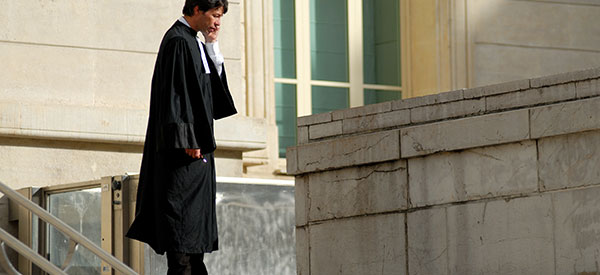
GET A FREE QUOTE
Simply fill out this form and a reputable lawyer in your area will contact you as soon as possible.


Request your quote now!


Simply fill out this form and a reputable lawyer in your area will contact you as soon as possible.


Request your quote now!
What must you do when someone sues you claiming that you have infringed on their rights? Who do you turn to when you want to assert your rights against someone who is abusing them? The answer- you contact a lawyer on the spot!
These legal professionals can offer you services and valuable advice about litigation and criminal charges against you, no matter where you are in the province!

Indeed, our partners in Brossard can help you and ensure that you do not lose your way in the complex Quebec legal system. Whatever you need, a lawyer can help you get justice and compensation for any wrong done to you.
The professional practice of law has always been segmented into different areas of specialization. Given the inherent complexity of each of the practice areas, many lawyers choose to limit their practice to these few areas only. There are, of course, lawyers qualified as “generalists” who do a little bit of everything, but the general rule is that lawyers are professionals who specialize in one or a few of the areas below.
Contract law: Whether it is for the drafting, cancellation, resolution, or termination of a contract, lawyers are competent to analyze and resolve your situation. Some contracts are fairly straightforward in terms of both their development and content but others have specific features inherent in their nature that justify the involvement of a lawyer in contract law.
Inheritance law: If you think a notary is the most competent lawyer in inheritance matters, you would not be completely wrong. After all, a notary is a public officer with the capacity to draft authentic records. This implies that in testamentary matters, for example, the notary can draw up a notarial will which will not have to be verified after death. Such a benefit obviously comes with a price. On the other hand, lawyers also have the ability to write wills without, however, enjoying the same powers as notaries; they are able to draw up wills in the presence of witnesses only.
While anyone is able to make such a document, having a lawyer prepare it will make your act, at the very least, legally binding. In addition, estate attorneys offer estate planning services. This is to protect your assets and your inheritance after your death.
Securities law: In the field of finance and law, lawyers practicing securities law are competent to offer advice to companies and individuals on everything related to the issuance of new stocks, the restriction of share capital, and securities legislation. These services are primarily addressed to the business world or to experienced investors seeking legal advice to optimize their investments.
Youth Law: A sub-branch of family law, youth law seeks to protect children in the legal battles they face. Whether these children are involved against their will in a dispute over their custody, divorce of their parents, or non-payment of child support, some lawyers specialize in representing minors to ensure their protection. On the criminal and penal side, youth lawyers work with the Director of Youth Protection (DYP) when reporting abuse and to remove children from abusive family environments.

Immigration Law: With a country wide open to immigration and a booming multiculturalism, a different immigration statuses exist in Canada. Different legal immigration statuses imply varying rights for the people involved. There may be times when a person’s presence on Canadian soil is compromised for some reason. When the government threatens deportation or sanctions, it’s time to consult an immigration lawyer!
Real estate law: Major real estate transactions, breaches of commercial and residential leases, zoning disputes, and supervision of construction projects are some of the initiatives with which a real estate lawyer can help you. It is, moreover, a specialty which encompasses several more specific areas of law such as property and obligations.
Are lawyers limited to one area of practice? It depends. As frustrating as that answer may be, the point is, there is no one-size-fits-all answer. Many lawyers choose to specialize in a specific area of law or a few related areas while others opt for a more generalized practice. It will be up to you to choose the type of professional that is right for you.
We briefly mentioned real estate law. While disputes with municipalities regarding zoning are frequent, one of the most common remedies sought by people are for hidden defects! Indeed, with the astronomical number of home sales concluded every year, it is no wonder that a few cases of hidden defects crop up. It is not always easy, however, to prove such a defect and even less so to prove that the previous owner should be held responsible. Here are the main elements to prove.
Prove the existence of the defect: Establishing that the defect exists requires proving a faulty workmanship, a manufacturing defect or abnormal wear and tear of the premises due to a deviation from the building standards. This deviation from the rules must not only exist but it must also interfere with the normal use of the premises. In other words, a construction defect which does not affect the normal enjoyment of the house will not be a hidden defect.
Demonstrate the seriousness of the defect: The seriousness of the defect is assessed according to a very specific legal criterion, either because if the buyer had known of the existence of the defect, he would not have bought the house or, if he had maintained his desire to buy it, would have paid a lower price to possess it. If such proof is not provided by the person alleging the existence of a hidden defect, the judge cannot consider that the criteria have been satisfied.

The buyer must have ignored the defect: If the buyer of a home became aware of the existence of the defect at any time during the transaction, it cannot be considered a hidden defect. The onus of proving that the defect was known will rest with the seller who will have to prove that the buyer knows the extent or existence of the alleged defect.
The defect must be concealed: As can be gleaned from its name, a hidden defect must be invisible. However, it is not always easy to do due diligence to establish the presence of a hidden defect without the intervention of an expert. This is why it is sometimes necessary to bring in a professional to analyze the situation of the house before the sale.
The defect must have existed before the house was sold. Obviously, for the seller to be held responsible for a hidden defect, it must have existed before the sale of the property. Furthermore, the effects of the defect can only have become apparent after the sale without any effect to its previous nature even though the defect was present when the seller was still the owner. The sooner the defect is reported to exist after the home is sold, the more the buyer can seek compensation and make the previous owner liable.
Hidden defects can cost you thousands of dollars! Renovations, expert intervention, disaster cleaners, not to mention the high risk of mold when water is involved! You do not have to be held financially responsible for such a fault: hire a lawyer to assert your rights!
In order to adequately govern contractual agreements entered into by businesses and individuals, the Civil Code of Quebec sets out the conditions that a contract must meet to be valid. The first condition is that of the capacity of the contractor. An incapacitated adult, for example, will not have the necessary capacity to make an agreement valid in the eyes of the law.
Any contract must also have an object as well as a legal cause. The object of the obligation is the service to which the debtor undertakes, for example to sell a bicycle. If the debtor tried to sell an illegal item, the contract would be void. The cause is the reason which justifies the existence of the contract, that is to say, the motives which prompted the individuals to enter into the contract together. If there are illegal reasons behind the contract, it will again be void.
What are the conditions and effects of the offer? The formation of a contract usually begins with the offer of one person to another for the purpose of making a deal. When the bidder sends an offer which has all the essential elements for concluding the contract, this produces legal effects.
Indeed, if the offer contains a term within which the person can respond, the bidder cannot revoke his offer. Otherwise, he can only retract it if the offer has not already been accepted. If this is the case and the acceptance is in accordance with the offer, we will be in the presence of a validly formed contract.
What are the conditions and effects of acceptance? On the other side of the offer is obviously acceptance, which too must meet certain formal conditions. First of all, it must be clear and unequivocal and must not modify any of the terms of the offer. If not, it will be more of a counter-offer and it will be up to the first bidder to respond.
Also, note that all of these steps can be performed verbally while still being perfectly valid! This will certainly complicate the proof to be made in the event of a dispute but it does not change the fact that the contract is validly formed and enforceable.
The causes of cancellation of contracts and defective consent: Sometimes a contract is formed with the appearance of a valid agreement when, in reality, there is a defect of consent behind it. If this is the case, the contract is not only invalid, but it can be declared void.
The cancellation of a contract is all the more serious since the contract is deemed never to have existed. What to do in such a situation? The benefits must be returned! This implies that each co-contracting party must remit to the other the service he received because we are trying to return to square one. Here are the situations justifying the cancellation of a contract.
A simple error arises when a contractor is mistaken either about the nature of the contract concluded, the substance of the object, or even an essential element of the contract. The nature of the contract error arises when, for example, a contractor thinks of entering into a rental contract but it is in fact a contract of sale.
Another cause for cancellation relating to simple error arises when the co-contractor is mistaken about an essential element of the contract which, if the contractor had known, he would not have contracted or he would have contracted under different conditions. An example may be the presence of a right of way on the ground or even a nearby airport.
Deceit is, for its part, an error that was caused by a co-contracting party in order to get the other person to contract. This can take the form of lies, maneuvering, and even silence of the person when they willfully fail to disclose certain information they have.
Since fraud is a tort, the person who commits it is exposed not only to the cancellation of the contract but also to punitive damages.
As you are now an expert on contract formation terms and the criteria for requesting its cancellation, it would be very helpful for you to learn more about the different types of contracts you are likely to encounter. Below you will find the principle types of contracts validly concluded in Quebec and in Brossard!

Synallagmatic contract: A synallagmatic contract is also called a “bilateral” contract when the co-contracting parties each commit to obligations which are reciprocal, that is to say, that the performance of one depends on the performance of a service of the other. Handing over a product in exchange for money is a prime example of a bilateral contract.
Unilateral contract: A contract will be qualified as unilateral when one person commits to another without the latter having any obligations in return. Donation is an example; the person receives the goods without giving anything in return.
Instant execution contract vs. for successive performance: For a contract to be considered to be instantaneous, the obligations of each must be capable of being fulfilled at one time. Paying a sum of money as remittance of a full payment is a good example.
On the other hand, a successive performance contract presupposes obligations realized in several moments. For example, an employment contract is successively executed because the employee works every day of the week and the employer remits the latter’s pay at the agreed frequency.
Contract of Adhesion: When one of the parties to a contract stipulates all the provisions that it contains without the other contracting party having the opportunity to negotiate, this will be an adhesion contract. This classification will be especially important if the contract is ambiguous and subject to interpretation by the court because such a contractual clause is interpreted against the one who makes the contract and is in favor of the one who contracts.
Contract by mutual agreement: As opposed to an adhesion contract, a contract by mutual agreement occurs when the parties freely negotiated the terms contained therein. The difference between a mutual contract and a contract of adhesion does not lie in the presence of negotiations between the parties but in the mere possibility of the terms being negotiated. If the possibility exists but a contractor does not avail himself of it, he has only himself to blame and it will still be a mutual contract.
Commutative contract vs. aleatory contract: An aleatory contract may seem strange at first glance because it consists of entering into a contract without the parties knowing the precise extent of the obligations arising from it. There is, therefore, an aspect of speculation linked to this type of contract whereas the commutative contract is one in which the parties know exactly what the contract implies.
To finish with the classification of contracts, it is important to note that a contract can appear in more than one of the categories mentioned above, subject to obvious contradictions between the different categories!
Anyone who has watched a crime or crime drama series knows that in order to get a conviction, the crown must prove that the accused committed a crime beyond a reasonable doubt. It is a phrase well known even to outsiders of the legal system. But what does this expression mean and what is reasonable doubt?
There is no universal agreement within the legal and academic world on the definition of reasonable doubt. However, criteria have, nonetheless, emerged from the many years of applying this vague principle to Western criminal law.
In particular, the judge or the jury (depending on the offense a person is charged) will have no other choice but to find an accused not guilty when they have doubts about his guilt or when they do not have an absolute certainty of the latter’s guilt. But what are the more solid criteria for such guilt?
The accepted version of the facts: The assessment of the version of the facts is left to the judge and jury. It is up to them to choose who to believe between the prosecution and the accused. When the accused’s narrative is credible enough to challenge the Crown’s thesis on the accused’s role, it will be necessary to err on the side of innocence.
Insufficient Doubt: It is possible that neither the judge nor the jury are inclined to believe the accused’s story but his report of the facts still raises some level of doubt. You guessed it, such uncertainty, no matter how slight, will push the judge to a verdict of not guilty.
Clearance of doubt: When the judge does not believe the facts alleged by the defense, the accused’s testimony will not cast doubt on his innocence and the crown has succeeded in proving his guilt beyond reasonable doubt. The judge will be more inclined to return a guilty verdict.
The role of the defense: Some believe that the prosecution and the defense have a similar role of debating the guilt of the accused. This is not correct, even if the reality suggests otherwise! In fact, it is up to the prosecution lawyer to build evidence beyond a reasonable doubt; the defense need only refute, even if it generally introduces its share of evidence and testimony.
Criminal evidence is no longer a secret to you but how is it different from that of a civil trial? In the latter, the plaintiff’s party has the burden of proving the facts supporting its claim but with the duty of attaining a lower burden of proof. This burden is called that of the balance of probabilities, is it more likely than not that the facts happened as the defendant alleges? The parties involved are, therefore, more on an equal footing than in a criminal trial.

It is not easy to accept being put behind bars, no matter what offense you are accused of. However, you make it much easier for the Crown to do so if you fail to hire a lawyer at the right time. If you are the target of a criminal charge, now is a good time to hire a lawyer! Ask for help from Compare Lawyers to simplify your search.
Businesses need lawyers as much as individuals. However, their needs differ in several respects. These different needs explain why many lawyers devote their practice exclusively to the needs of businesses. One of the popular processes required by businesses is incorporation – a process of changing the legal structure of the company to give it new rights and obligations. Your business, whatever its size, could benefit from such a renewed structure!
Limited liability. A business that becomes a company through incorporation acquires a legal personality of its own. While a sole proprietorship has one or a few people who bear responsibility for all of its actions, a company is owned by its shareholders. The latter, unlike individual owners, cannot be held personally responsible for the actions of the company.
So if you own an unincorporated business, you are personally liable every time the business commits an act. It also implies that you are prosecuted both in civil and criminal matters. Don’t stay exposed this way for a second longer: choose incorporation.
Tax savings. When a person operates a sole proprietorship, the tax report of that person and his business is joint. You realize that by combining two incomes, the level of taxes payable increases dramatically. Incorporation allows tax reporting to be separated, saving money on both sides, as businesses have their own tax rates that are often more favorable than individuals.
The survival of the company. The death of the owner of an unincorporated business jeopardizes the survival of the business. Who will take over if he or she has no family or has not had time to train a successor? On the other hand, since an incorporated business is owned by its shareholders, the death of one of them will not affect the survival of the business.
Increased investment and financing potential. Banks are more inclined to lend money to companies than to individuals, especially when they are performing well. The reason is that banks can take mortgages and collateral on several assets owned by companies whereas they are more limited when doing business with individuals. The investment possibilities are, therefore, more numerous when banks feel safe!
Several business structures exist and it will be the role of your business lawyer to show you which one is best for you. Whether it is a joint stock company, a general partnership, a limited partnership or whether your sole proprietorship is the solution to maintain, your lawyer is the best person to give you advice!
Knowing the high price of legal fees, you would naturally expect a certain level of service from your lawyer, right? This is quite normal and these are the main services lawyers offer regardless of the type of dispute you want to settle.

Representation in court: Lawyers are trained to plead before all courts in the province, regardless of the nature of your trial. Obviously, some lawyers specialize in litigation which makes them better positioned to represent your interests during lengthy trials. This is all the more true in criminal law!
Negotiation with the opposing party. Trial is sometimes (even often) a remedy that is best avoided. Complex and exhausting, it is preferable to reach an out-of-court settlement with the adversary in civil law. This agreement is only concluded after negotiations between your lawyer and that of the counterparty. Find yourself a good civil lawyer and you might get financial compensation!
Dispute mediation / arbitration. An alternative to negotiation when it fails or does not find a relevant solution is dispute mediation or arbitration. Several Quebec civil law lawyers have additional training allowing them to carry out such legal initiatives. You may take advantage of their skills in your legal dispute.
Are you exhausted from the endless debate in your legal dispute? Don’t let your situation get worse and call a lawyer in Brossard now!
Whatever the nature of your legal dispute or criminal charge, we know lawyers who can get you out of a difficult situation.
Indeed, we have a vast network of partner lawyers in the Brossard area practicing in the different specializations of law. One of them can help you with your legal problem.
To get connected with the best lawyers in Brossard, complete the online form on this page and you will receive a response without delay!
This service is free and no obligation! Start your search for the right lawyer to handle your case today.


Simply fill out this form and a reputable lawyer in your area will contact you as soon as possible.


Request your quote now!